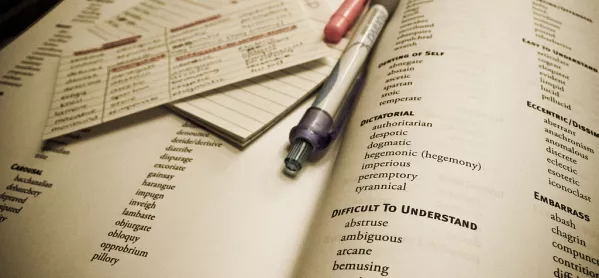Let’s start with a little activity. Please pick an article that you have read from any magazine (it could even be an old copy of TES!) First, do the unthinkable and deface the brain-bendingly good writing by blacking out about ten percent of the text.
Now, read the article again. How does it feel to re-read this partial text? Unsettling and rather challenging, I bet. What you have experienced in that moment is what most of our students face each day when they read academic texts in our classroom.
To support our students we need to better train them to overcome the barriers they face with tricky vocabulary. Here are some handy strategies for your planning and teaching:
- Test their vocabulary knowledge
We can start by testing them on the key vocabulary in our subject to ascertain what they know. Do they know these tricky terms and can they use them? Regular, quick quizzes can prove a boon. The results provide us with essential planning feedback.
- Fill your classroom with ‘word consciousness’
Expert teachers can easily forget the vast wealth of words at their disposal. We need to make the rich vocabulary of our subject explicit. We can foster ‘word consciousness’ - a curiosity for words and their meaning - in many ways. We can display words and word families, or share ‘words of the week’, hold competitions and lots of other approaches to help students get to grips with words.
- Tell the story of your specialist subject vocabulary
Words are fascinating things. Telling their story can make learning really stick; you can unearth gems by exploring the etymology of words. Did you know the word ‘muscle’ comes from Latin roots meaning ‘little mouse’? Oddly, our forebears believed that muscles looked like little mice under the skin. How about that to make your biology lesson a little more memorable!
- Dig at the roots
The clues to many pieces of challenging vocabulary is hidden within the word. Help students uncover those hidden meanings by spying common root words, prefixes and suffixes. Take these prefixes: ‘bio’ (from the Greek ‘bios’ - one life, or way of living); ‘ambi’ (both); ‘agri’ (field, soil); and ‘anti’ (against). When students recognise these patterns they are better prepared to comprehend new, unfamiliar words.
- Compile a working glossary
This is a common strategy for most subject teachers, but stuffing a list in the back of a book won’t make a difference. Instead, we need to use such a bank of words regularly and systematically.
Delving into the world of words is not simply the preserve of bookworm English teachers. If we are to make any subject best understood for our students we must plan to explicitly teach its tricky words.
Alex Quigley is an English teacher and Director of Research School at Huntington School. He is the author of ‘The Confident Teacher’.




